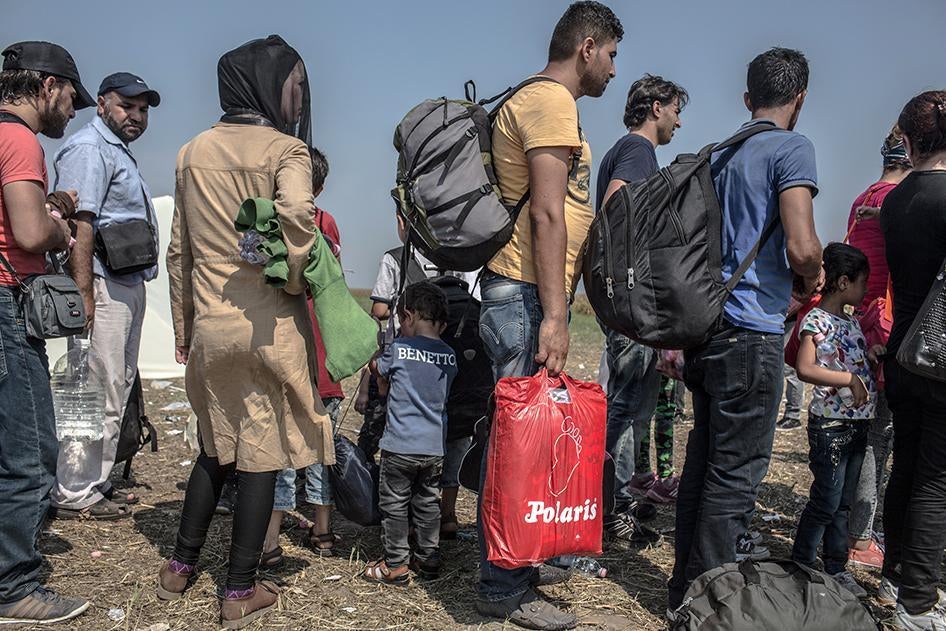(Brussels) – The European Union and its 28 member states should act immediately to address the human rights crisis resulting from years of mismanaging migration and asylum, Human Rights Watch said today. With a humanitarian crisis on the Greek islands, a dysfunctional asylum system in Hungary, thousands of new arrivals in need of protection, and many deaths at EU borders, bold steps are needed at an EU summit on September 14, 2015.
“Europe is showing a staggering lack of political will and humanity to grapple with this refugee and migrant crisis,” said Judith Sunderland, associate Europe and Central Asia director. “EU leaders should be guided by the imperative to protect lives and ensure humane treatment.”
Human Rights Watch calls on all EU decision-makers at a minimum to support:
- More safe and legal channels for people to seek asylum or find refuge in the EU without resorting to dangerous routes and unscrupulous smugglers. This includes significantly increasing refugee resettlement from other regions of the world and greater avenues for family reunification. Current EU resettlement pledges of 22,000 are insufficient. Expanding the use of humanitarian visas to allow people to travel to the EU for a temporary period or to apply for asylum could help.
- Fixing the EU’s broken asylum system. Despite common rules and standards, wide disparities exist among EU member states with respect to reception conditions, recognition rates, and integration measures. The European Commission should step up efforts to monitor and enforce standards, including through infringement proceedings. The European Asylum Support Office, the European Refugee Fund, and others should assist underperforming member states and states currently receiving the vast majority of new arrivals, to ensure proper reception conditions, correct, speedy, and transparent processing, and that the rights of asylum seekers and migrants are fully respected.
-
Robust search and rescue operations in the Mediterranean. Stepped up efforts since May 2015 have made a difference – these efforts should be sustained over the long-term.
-
A permanent relocation scheme to share asylum seekers across member states. This would help address fundamental distortions created by the Dublin Regulations that place the onus for processing asylum claims on the first EU country of entry. This puts an unfair burden on countries at the EU’s external borders, such as Greece, where the current influx and poor management have created a humanitarian crisis. Dublin reform is vital so that responsibility is based on capacity and other relevant criteria rather than location, and takes into account the asylum seeker’s individual circumstances.
-
Develop a list of “unsafe” countries whose nationals are presumed to need international protection. Applications could then be processed under streamlined procedures, which could help reduce growing backlogs in asylum systems, and harmonize EU governments’ approach to national groups at risk. At present the EU is focused on agreeing a common list of “safe” countries, with a presumption to deny asylum applications by their nationals.
EU interior ministers will gather in Brussels on September 14 for an extraordinary meeting focused primarily on returns policy, countering smuggling networks, and international cooperation. European Commission President Jean-Claude Juncker is expected to highlight proposals from the commission in his September 9 state of the union address.
Media reports suggest the commission will propose that EU countries pledge to relocate 120,000 asylum seekers from Italy, Greece, and Hungary to alleviate the pressures at external borders. This is triple the number discussed in July, when the proposal referred only to Italy and Greece. At that time, EU countries pledged to take only 32,256, well below the target goal of 40,000. The United Nations High Commissioner for Refugees said as many 200,000 might need relocation.
The commission is also expected to propose a permanent mechanism for distributing asylum seekers among EU countries in emergency situations.
If swiftly implemented, these measures could help improve the situation for thousands of asylum seekers, Human Rights Watch said.
According to the International Organization for Migration, more than 350,000 people have reached the EU via the Mediterranean this year. More than 2,000 have died trying. It is unknown how many died at EU land borders in 2015.
“The EU has wasted too much time over internal squabbles,” Sunderland said. “It’s time for each EU government to take stock of its responsibilities to hundreds of thousands of people in need of protection, and get on the right side of history.”








